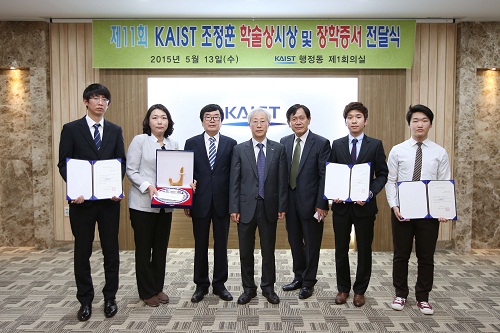people
Doctor Gyu-Tae Kim from General Electric (GE) received the eleventh Cho Jeong-Hoon Academic Award. The award ceremony took place in the main conference room of the administration building on campus on May 13, 2015.
Dr. Kim, a graduate of KAIST, conducts research in the field of instable swirl combustion of gas turbines and has contributed to the development of aircraft engines. He earned his name as a researcher by identifying, for the first time in the world, the correlation between the thermoacoustic instability of gas turbine engines and the complex response of swirl flames.
Along with Dr. Kim, Shin-Jae Kang of the Aerospace Engineering Department, KAIST, Yong-Gyun Bae of the Mechanical Engineering Department, Korea University, and Ji-Won Kim from Kongju National University High School, received the Cho Jeong-Hoon scholarship.
The award was created in commemoration of Cho Jeong-Hoon who was killed in an explosion during his research at the KAIST Rocket Laboratory on May 13, 2003. Cho’s parents donated USD 450,000 to KAIST in his memory. Since 2005, a total of four students from KAIST, Korea University, and Kongju National University High School, all of which the late Honorary Doctor Cho attended, have received the scholarship.

-
research KAIST reveals for the first time the mechanism by which alcohol triggers liver inflammation
<(From left)Dr. Keungmo Yang, Professor Won-Il Jeong, Ph.D candidate Kyurae Kim> Excessive alcohol consumption causes alcoholic liver disease, and about 20% of these cases progress to alcohol-associated steatohepatitis (ASH), which can lead to liver cirrhosis and liver failure. Early diagnosis and treatment are therefore extremely important. A KAIST research team has identified a new molecular mechanism in which alcohol-damaged liver cells increase reactive oxygen species (ROS), leading
2025-07-17 -
research KAIST Develops Robots That React to Danger Like Humans
<(From left) Ph.D candidate See-On Park, Professor Jongwon Lee, and Professor Shinhyun Choi> In the midst of the co-development of artificial intelligence and robotic advancements, developing technologies that enable robots to efficiently perceive and respond to their surroundings like humans has become a crucial task. In this context, Korean researchers are gaining attention for newly implementing an artificial sensory nervous system that mimics the sensory nervous system of living org
2025-07-16 -
research Professor Jung-woo' Choi ‘s Team Comes in First at the World's Top Acoustic AI Challenge
<Photo1. (From left) Ph.D candidate Yong-hoo Kwon, M.S candidate Do-hwan Kim, Professor Jung-woo Choi, Dr. Dong-heon Lee> 'Acoustic separation and classification technology' is a next-generation artificial intelligence (AI) core technology that enables the early detection of abnormal sounds in areas such as drones, fault detection of factory pipelines, and border surveillance systems, or allows for the separation and editing of spatial audio by sound source when producing AR/VR conten
2025-07-13 -
research KAIST researcher Se Jin Park develops 'SpeechSSM,' opening up possibilities for a 24-hour AI voice assistant.
<(From Left)Prof. Yong Man Ro and Ph.D. candidate Sejin Park> Se Jin Park, a researcher from Professor Yong Man Ro’s team at KAIST, has announced 'SpeechSSM', a spoken language model capable of generating long-duration speech that sounds natural and remains consistent. An efficient processing technique based on linear sequence modeling overcomes the limitations of existing spoken language models, enabling high-quality speech generation without time constraints. It is expe
2025-07-04 -
event 2025 KAIST Global Entrepreneurship Summer School Concludes Successfully in Silicon Valley
< A group photo taken at the 2025 GESS Special Lecture.Vice President So Young Kim from the International Office, VC Jay Eum from GFT Ventures, Professor Byungchae Jin from the Impact MBA Program at the Business School, and Research Assistant Professor Sooa Lee from the Office of Global Initiative> The “2025 KAIST Global Entrepreneurship Summer School (2025 KAIST GESS),” organized by the Office of Global Initiative of the KAIST International Office (Vice President
2025-07-01